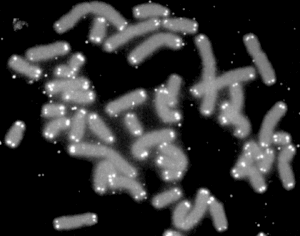Telomere
A telomere is a region of DNA at the end of a chromosome. It protects the end of the chromosome from deteriorating (getting worse) or fusing (joining) with other chromosomes.

The telomeres are made of repeated sequences of DNA ('repetitive DNA'). During cell division, enzymes that duplicate DNA cannot continue their work all the way to the end of chromosomes. If cells divided without telomeres, they would lose the ends of their chromosomes, and the information they contain.
The telomeres are disposable buffers blocking the ends of the chromosomes. They are destroyed during cell division, and are remade by an enzyme, telomerase reverse transcriptase.[1]
The Australian Elizabeth Blackburn and the Americans Carol Greider and Jack Szostak won the 2008 Nobel Prize in Physiology or Medicine for their work on telomeres.
References change
- ↑ Elizabeth Blackburn: AtGoogleTalks, August 20, 2008 Molecular biologist Elizabeth Blackburn